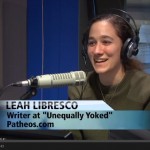Commenter Aristarchus is pretty much in complete disagreement with my weighting of evidence for God in yesterday’s post. Aristarchus said:
To be convinced that a god or gods existed, I would need to see some sort of proof of supernatural powers. If someone came to me in a dream and made very specific, unlikely predictions, that I wrote down and talked about at the time, and then those things happened, that would be evidence. (If the event was sufficiently unlikely to be true by chance, it might be strong enough evidence for me to really question my belief.) If the Pope or someone was able to make predictions of this sort that routinely came true, that would probably also work. Similarly, if the holy book of some religion had such clear and correct prophecies, or if it had revealed some extensive new scientific knowledge, that might work. I need actual proof of the supernatural, not just proof that the idea of the supernatural is appealing to many people (myself included).
I confess, I still don’t see evidence of the supernatural as particularly potent evidence for god.
To begin with, the prevalence today of magicians, con artists, and special effects artists makes it a good deal more difficult to offer any proof of the truly supernatural, were it to exist. Illusionists perform at such a high level that it requires a higher level of expertise than I possess to detect their trickery. Thus, I am incapable of properly investigating these claims myself and must employ and expert (who I feel I can trust) to do it for me.
Assuming the expert verifies the supernatural claim (which only means saying that no explanation could be found at this time), what should I believe?
Seemingly supernatural events aren’t automatically evidence against a naturalistic theory of the world. It is only evidence that my current understanding is incomplete. It might be a case of sufficiently advanced technology. It might be Shermer’s corollary that “sufficiently advanced extraterrestrial intelligence is indistinguishable from God.” It might just be magic.
Drawing on my steady diet of fantasy novels, I take magic to be any activity that is supernatural, but limited in scope and which imputes no special moral status to the practitioner. Thus, even if the Pope proved himself to be a reliable oracle, I wouldn’t presume that he was necessarily a better guide to religious or moral life than Sybil Trelawney.
Aristarchus said:
I also don’t care that much about the nature of God. Once someone proved he did exist, I would see no reason to default to him being bad, so pretty weak evidence might convince me that he’s probably good.
Ultimately, I see proofs of God’s existence as tied up in proofs of his goodness. Verifiably supernatural events make it more likely that entities exist that can essentially perform miracles. God is just one of many elements in this set, and he is not necessarily more plausible than any of the other possible purveyors of the paranormal. It is true that miracles and other supernatural occurrences are weak evidence for god, but they are equally weak evidence for a community of wizards actively resisting entropy. It is beyond my ability to distinguish one from the other on the basis of supernatural experiences alone.











